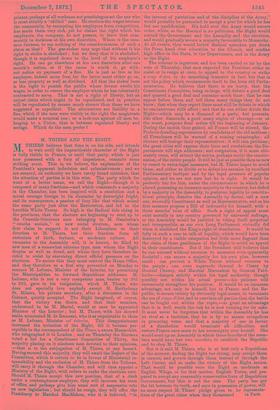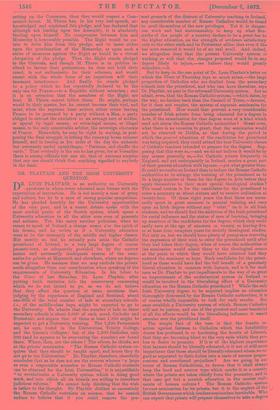M. TRIERS AND THE RIGHT.
AT TRIERS believes that time is on his side, and intends .111 • to wait until the impracticable character of the Right is fully visible to France, or until that party, which is just now possessed with a fury of impatience, commits some striking error. This is, we believe, the explanation of the President's apparent indecision and submissiveness ; and we are assured, on authority we have rarely found mistaken, that the situation of parties is in this wise. The party which for want of a better name, we call the Right—though it is composed of many fractions—and which commands a majority in the Chamber, has been inspired with a resolution and a moral courage foreign to its character by downright fright, and its consequence, a passion of fury like that which seized the same party just after the Restoration, and led to the horrible White Terror. So high is the Radical tide rising in the provinces, that the electors are beginning to send up to the Conseils-Generaux men belonging to M. Gambetta's " couche sociale," or new social stratum, men whose first claim to support is not their Liberalism or their devotion to M. Thiers, but their freedom from all restraints of birth, fortune, or academic culture. All vacancies in the Assembly will, it is known, be filled by new men of a somewhat extreme type, men whom the Right despise as well as dread, and whom they have therefore de- cided to resist by exercising direct official pressure on the elections. To secure this they must control the Home Office, and they therefore as a first step proceeded on Monday to censure M. Lefranc, Minister of the Interior, for permitting the Municipalities to forward Republican addresses. M. Lefranc, who is not a very competent man, beaten by 305 to 299, gave in his resignation, which M. Thiers, who does not specially love anybody except M. Barthelemy St. Hilaire, his private secretary, after a discussion in the Cabinet, quietly accepted. The Right imagined, of course, that the victory was theirs, and that their nominee, understood to be M. Martel, would at once be appointed Minister of the Interior ; but M. Thiers, with his shrewd smile, nominated M. de Remnsat, who is as unpalatable to them as M. Lefranc, Minister ad interim. This disappointment increased the irritation of the Right, till it became per- ceptible to the correspondent of the Times, a sworn Monarchist, who telegraphed it to London ; and on Thursday the Bureaux voted a list for a Constituent Committee of Thirty, the majority placing on it nineteen men devoted to their opinions, —that is to the subjugation of M. Thiers, at any hazard. Having secured this majority, they will await the Report of the Committee, which is certain to be in favour of Ministerial re- sponsibility and the exclusion of M. Thiers from the Tribune, will carry it through the Chamber, and will then appoint a Ministry of the Right, with orders to make the elections sure. Should M. Thiers accept this new position, that of a clerk under a contemptuous employer, they will increase his term of office, and perhaps give him some sort of suspensive veto on new legislation ; but should he resign, they will offer the Presidency to Marshal MacMahon,, who it is believed, "in the interest of patriotism and of the discipline of the Army," would probably be persuaded to accept a post for which he has but one qualification. His hold over the Army would ensure order, while, as the Marshal is no politician, the Right would control the Government and the Assembly and the elections, and would gradually secure a majority favourable to Monarchy. At all events, they would forbid Radical speeches, put down the Press, hand over education to the Church, and confine high office in the State, in the Departments, and in the Army to the Right.
The scheme is ingenious, and has been carried so far by the vote of Thursday, that men expected the President either to resist or to resign at once, to appeal to the country or strike a coup d'itat, to do something dramatic in fact, but that is not the policy which recommends itself to the keen old Parlia- mentarian. He believes that there is no hurry, that the Constituent Committee, being so large, will debate a good deal and quarrel a good deal and consume much time ; that he can appear before them and tell them many things they do not know; that when they report there must still be debate in which he can intervene with effect ; and that he can either divide the Right—which may be a diamond of a party, but presents, like other diamonds, a good many angles of cleavage—or at the worst, postpone final action till the beginning of January. During the month thus gained, all France will be stirred, the Prefects dreading supersession by candidates of the old noblesse ; all Frenchmen will be warned of a coming catastrophe ; all electors will besiege their representatives; it will rain petitions ; the great cities will express their fears and resolutions, the De- partments will sign addresses; and resignation, if it must ulti- mately come, will attract the notice, perhaps excite the conster- nation, of the entire people. It will be just as possible then as now to resort to extra-legal measures, but M. Thiers hopes to avoid them, and either to divide or to defeat his enemies by excellent Parliamentary tactique and by the legal pressure of popular opinion, and we are not sure but he is right. It would be perfectly fair for him, under the circumstances in which he is placed, possessing an immense majority in the country, but defied by a majority in the Assembly, to postpone legality to constitu- tional principle, dissolve the Assembly by decree, call a new one, avowedly Constituent as well as Representative, and as his first measure propose a Bill of indemnity for himself, with a three months' term of office. Such a right of appeal must exist morally in any country governed by universal suffrage, or the Assembly would be justified in voting itself perpetual and irresponsible, as our own Long Parliament virtually did when it abolished the King's right of dissolution. It would be folly in such a case to talk,of legality, which would have been destroyed by a visible usurpation but little more flagrant than the claim of these gentlemen of the Right to avoid an appeal to their constituents. But if the President still believes that he can succeed without recourse to measures even apparently doubtful ; can secure a majority for his own plan, however small ; can prevent a White Terror without recourse to the people ; can even supersede General de Cissey by General Chanzy, and Marshal Macinahon by General raid- herbe—changes strictly within his legal authority, though possibly not within his actual power—hie patience will enormously strengthen his position. It would be an immense advantage, not only to himself, but to France and the Re- public, to secure victory by obviously legal means, to terminate the era of coups d'e'tat, and to convince all parties that the battle can be fought out within the ropes,—so great an advantage that it is well worth the risk he is now running for its sake.
It must never be forgotten that within the Assembly he has no rival as a tactician, that he is by no means scrupulous in procuring votes, and that a majority of one in favour of a dissolution would terminate all difficulties, and restore France once more to her sovereignty over herself. She would send up an Assembly in which three-fourths of the mem- bers would have but two mandate, to establish the Republic and to obey M. Thiers. But it is said M. There, who is at best only a Republican of the morrow, finding the Right too strong, may accept them in earnest, and govern through them instead of through the Left Centre, and so make the victory of the Right secure. That would be possible were the Right as moderate as English Whigs, or for that matter, English Tories, and pre- pared to accept any reasonably conservative form of Republican Government, but this is not the case. The party has got the bit between its teeth, and once in possession of power, will no more respect M. Thiers' pledge given to he representa- tives of the great cities when they threatened in Paris setting up the Commune, than they would respect a Com- munist decree. M. Thiers has, in his very last speech, ac- knowledged and explained this pledge, and has declared that although not binding upon the Assembly, it is absolutely binding upon himself. No compromise between him and Monarchy is honourably possible. The Right would be cer- tain to drive him from this pledge, and to insist either upon the proclamation of the Monarchy, or upon such a series of measures against the Right as would be a virtual abrogation of the pledge. Then the Right stands pledged to the Clericals, and though M. Thiers is in politics in- clined to favour their pretensions, he does not hold their creed, is not enthusiastic for their schemes, and would resent with the whole force of an imperious will their incessant interference. And finally, he stands pledged to a policy which he has repeatedly declared to be the only one for France,—to a Republic without ostracism ; and it is on ostracism that the members of the Right are bent. M. Thiers cannot follow them. He might, perhaps would be their master, but he cannot become their tool, and must, when the supreme hour arrives, either retire leaving France to be governed by a party without a Man, a party obliged to entrust the executive to an average sort of soldier, or appeal by legal means, or extra-legal means, or illegal means, to the only conceivable arbiter, the sovereign electorate of France. Meanwhile, he may be right in waiting, in post- poning the final struggle, in letting the runaway horse exhaust himself, and in issuing as his order of the day the unheroic but extremely useful apophthegm, "Patience, and shuffle the cards." That evidently is the cue he has given, for at Versailles there is among officials but one air, that of extreme surprise that any one should think that anything signified to anybody in the least.



































 Previous page
Previous page